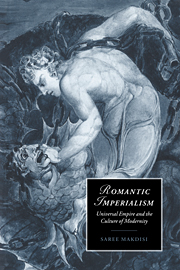Book contents
- Frontmatter
- Contents
- Preface and acknowledgments
- 1 Introduction: Universal Empire
- 2 Home imperial: Wordsworth's London and the spot of time
- 3 Wordsworth and the image of Nature
- 4 Waverley and the cultural politics of dispossession
- 5 Domesticating exoticism: transformations of Britain's Orient, 1785–1835
- 6 Beyond the realm of dreams: Byron, Shelley, and the East
- 7 William Blake and the Universal Empire
- 8 Conclusions
- Notes
- Bibliography
- Index
- CAMBRIDGE STUDIES IN ROMANTICISM
Preface and acknowledgments
Published online by Cambridge University Press: 29 September 2009
- Frontmatter
- Contents
- Preface and acknowledgments
- 1 Introduction: Universal Empire
- 2 Home imperial: Wordsworth's London and the spot of time
- 3 Wordsworth and the image of Nature
- 4 Waverley and the cultural politics of dispossession
- 5 Domesticating exoticism: transformations of Britain's Orient, 1785–1835
- 6 Beyond the realm of dreams: Byron, Shelley, and the East
- 7 William Blake and the Universal Empire
- 8 Conclusions
- Notes
- Bibliography
- Index
- CAMBRIDGE STUDIES IN ROMANTICISM
Summary
Where today are the Pequot? Where are the Narragansett, the Mohican, the Pokanoket, and many other powerful tribes of our people? They have vanished before the avarice and the oppression of the White Man, as snow before a summer sun.
Tecumseh, in Dee Brown, Bury my Heart at Wounded KneeAll Love is lost Terror succeeds & Hatred instead of Love And stern demands of Right & Duty instead of Liberty.
William Blake, The Four ZoasIn the years between 1790 and 1830, over one hundred and fifty million people were brought under British imperial control. During those same years, one of the most momentous outbursts of British literary and artistic production took place in romanticism, announcing the arrival of a whole new age, a new world of social and individual traumas and possibilities. The starting point of the research project that resulted in this book was an intuitive assumption that these events were somehow related to each other; what Irealized by the end was that an adequate understanding of either event requires an understanding of both – at one and the same time – if it is not to be seriously flawed.
Romanticism cannot be understood properly without reference to modern imperialism and modern capitalism: perhaps this seems clear enough. Modern imperialism and modern capitalism cannot be properly understood without reference to romanticism: this may not seem quite so clear at all.
- Type
- Chapter
- Information
- Romantic ImperialismUniversal Empire and the Culture of Modernity, pp. xi - xviPublisher: Cambridge University PressPrint publication year: 1998



